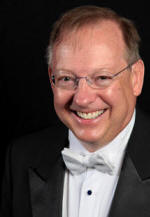 British conductor and early music specialist Nicholas McGegan will lead
Handel’s glorious Samson on March 4 at 8 PM at Alice Tully Hall at
Lincoln Center. The performance will feature the American Classical Orchestra
and soloists Thomas Cooley (Samson), Megan Chartrand (Dalila), Virginia Warnken
(Micah), John Taylor Ward (Manoa) and Andrew Padgett (Harapha). Samson,
a dramatic three-act oratorio, is considered one of Handel’s finest works. The
piece uses a libretto by Newburgh Hamilton, who based it on Milton’s Samson
Agonistes, which was based on the figure Samson in the Book of Judges.
There will be a pre-performance discussion with musicologist Dr. Neal Zaslaw at
7:00 PM at Alice Tully Hall. Tickets can be purchased online at www.aconyc.org
or lincolncenter.org; by phone at Center
Charge (212-721-6500) or the Alice Tully Hall Box
Office (212-671-4050); or in person at the Alice
Tully Hall Box Office. Prices ranges from $35-$90. Amanda Coleman spoke with Mr.
McGegan about the upcoming performance.
British conductor and early music specialist Nicholas McGegan will lead
Handel’s glorious Samson on March 4 at 8 PM at Alice Tully Hall at
Lincoln Center. The performance will feature the American Classical Orchestra
and soloists Thomas Cooley (Samson), Megan Chartrand (Dalila), Virginia Warnken
(Micah), John Taylor Ward (Manoa) and Andrew Padgett (Harapha). Samson,
a dramatic three-act oratorio, is considered one of Handel’s finest works. The
piece uses a libretto by Newburgh Hamilton, who based it on Milton’s Samson
Agonistes, which was based on the figure Samson in the Book of Judges.
There will be a pre-performance discussion with musicologist Dr. Neal Zaslaw at
7:00 PM at Alice Tully Hall. Tickets can be purchased online at www.aconyc.org
or lincolncenter.org; by phone at Center
Charge (212-721-6500) or the Alice Tully Hall Box
Office (212-671-4050); or in person at the Alice
Tully Hall Box Office. Prices ranges from $35-$90. Amanda Coleman spoke with Mr.
McGegan about the upcoming performance.
Amanda Coleman: Why do you think this piece is considered one of Handel’s finest works?
Nicholas McGegan: Firstly, the music is of consistently superlative quality and nobility. Also the principal roles are so varied and so emotionally very strong. The portrait of Samson in his blindness is deeply moving. Handel was, of course, not to know that a decade after composing it he too would lose his eyesight. But there is also some humour in the role of Dalila.
AC: Can you please tell us what it’s like to work with the soloists and chorus on this project?
NMcG: I am so delighted that Thomas Cooley will be singing the title role. We did the piece in Germany and recorded it too. He is a masterly Handel singer and his performance of Samson is superb. All the other soloists are people I have worked with before and mostly on this very piece.
AC: Can you describe the process you go through when preparing for a performance?
NMcG: For a work like this Handel oratorio, I generally use my own set of orchestral parts which has a lot of my interpretive marking written in. This means I have to do a lot of preparation, which is a joy for me, but we save a lot of time in rehearsal. Each year I do several baroque works that perhaps have not been played for several hundred years. It is a wonderful experience to work on them and bring them back to life.
AC: Is there a particular conductor who you consider to be a mentor or inspiration?
NMcG: As a student at Cambridge, I was lucky enough to play in an orchestra conducted by Benjamin Britten. Then when I became a professional musician I performed as a flute player and harpsichordist under Roger Norrington, John Eliot Gardiner, Christopher Hogwood and Trevor Pinnock. Each one was a real inspiration; so many great and new insights into the music of the past.
AC: What is one of the most memorable performances you’ve experienced, either as a musician or a concertgoer?
NMcG: I do remember hearing the Marriage of Figaro for the first time (back then it was on six LPs) when I was about eight years old. Benjamin Britten, in whose orchestra I played while at Cambridge, was probably the most remarkable musician I have ever met. We performed Handel's L’Allegro on Britten's 100th birthday this past November 22.
AC: What kind of music did you listen to growing up and how did those artists’ affect your career interests?
NMcG: Both of my parents were artists and had no particular interest in music, so I was left alone to explore the world of music (not just classical) on my own. I did manage to get a nice collection of classical LPs together by the time I was a teenager and then the Beatles came along……
Amanda Coleman is a publicist at Dan Dutcher Public Relations.
